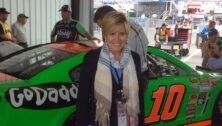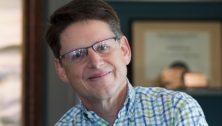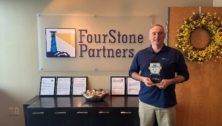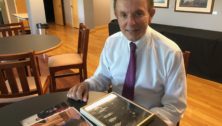Chester County Leadership: Dr. Stacey Robertson, President, Widener University
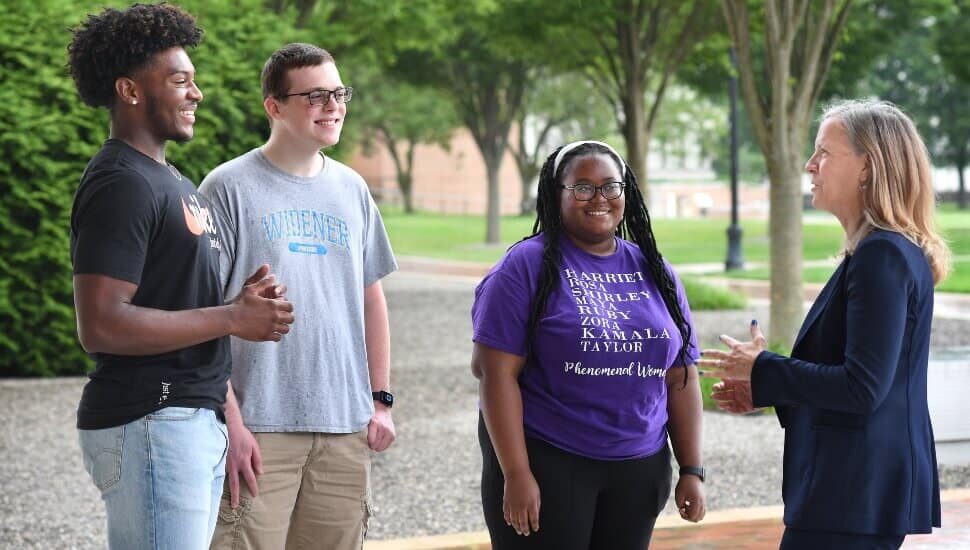

Stacey Robertson, president of Widener University, spoke to VISTA Today about her childhood in Scottsdale, Arizona, and San Jose, California, where she played as many sports as possible, including volleyball, softball, soccer, and basketball. In college, she played on the inaugural women’s water polo team and designed her own major called Social History and Social Movements.
After undergrad, she earned her doctorate in history and became a professor at several colleges across the country. This summer, she joined Widener University as the president after being impressed by the school’s sense of community.
Robertson discussed the importance of helping students graduate on time and Widener’s efforts to recruit a large and diverse first-year class in 2023.
Where were you born, and where did you grow up?
I was born a middle child in Scottsdale, Arizona, and lived there until about third grade. When I was in fourth grade, we moved to San Jose, California.
What did your parents do?
My mother was an elementary school teacher, and my father was an electrical engineer for National Semiconductor.
What memories do you have of growing up in Scottsdale or San Jose?
Mostly wonderful memories. The difference between growing up in Arizona and California is distinct because Arizona, of course, is the desert, and the Bay Area is more lush.
We did a lot of camping trips in both Arizona and California. Arizona was less built up than it is now, whereas San Jose was urban and suburban sprawl.
What made you so passionate about athletics?
I loved the competition, developing physical skills, and having fun with my friends. I enjoyed everything – softball, soccer, basketball.
What sport were you best at?
Volleyball was my passion. I played it in high school.
Is there a volleyball match that stands out in your memory?
There’s a moment that stands out, but it’s not volleyball. I played water polo in college. My tiny liberal arts college – Whittier College – beat the University of California at San Diego. I scored one of the winning goals, so it was one of those classic underdog stories of coming from behind and beating this powerhouse.
How did you find your way into water polo?
Well, it’s popular in southern California, and it is a lot like volleyball and basketball.
We started the team in my first year of college, so it was a brand-new team. My roommate and I became very passionate about water polo in part due to our friendship with a player on the men’s team who introduced us to the sport.
What part-time jobs did you have while you were growing up?
My first job was at Round Table Pizza in San Jose when I was 15 and a half years old. I worked from then on in a variety of jobs. I babysat, waitressed, worked at Hardee’s, in the safety office at college, and at Baskin-Robbins. All those typical teenage part-time jobs.
What lessons did you take from those experiences that still influence your work?
I take hard work very seriously. No matter what the job, you show up on time, do your work, and do your best. Ultimately, those jobs teach you the importance of customer service. That’s always been important to me.
Where did your work ethic come from?
My father ingrained in us a very strong work ethic from an early age. My siblings and I always had obligations and chores around the home that we were responsible for, and we were expected to work part-time outside the house when we were old enough.
What about music? What music floated your boat?
I attended high school and college in the ’80s. My first concert was The Clash. What an experience! I was into R.E.M. and the Talking Heads. When I was in L.A. in college, there was a local band called the Rave-Ups that I loved. But I also listened to a little hip-hop by women, like Queen Latifah and Salt-N-Pepa. And Bruce Springsteen, of course.
Where did you end up going to college?
I was a pretty good student – not the best, but pretty good. My time at Whittier College, a small, liberal arts college in southern California best known as President Nixon’s alma mater, was a great experience. I needed something small where I could find my comfort zone and my curiosity.
I went to college thinking I would be a lawyer because I ultimately – and this is oddly specific – wanted to be a U.S. Senator. I don’t even know where that dream came from. I majored in math for a couple of years, thinking that would help me think logically, and then I fell in love with history. I designed my own major called Social History and Social Movements.
What period of history got your attention?
The 19th century – it was a time of conflict, religious awakenings, incredible technological change, and everything you can imagine. Earlier, in high school, I became interested in social justice, and the 19th century was a great time for social justice movements.
I was lucky that my mentor in college introduced me to a set of papers in the library called the Pillsbury Papers. Those papers, which were not well-known, introduced me to the patriarch of that family, Parker Pillsbury. He was a radical abolitionist who worked closely with William Lloyd Garrison, Wendell Phillips, and Sojourner Truth. There was only one article written about him. I fell in love. Parker Pillsbury became my senior project, dissertation, and first book.
When did you figure out that you wanted a career in education?
When I went on to get my Ph.D. in history, I still had that passion for writing, which manifested in historical writing. I knew having a career writing history without having a paycheck would be difficult. I wanted to work in higher education because it was a great opportunity to continue my love of writing and research, and mentor students. Teaching allowed me to engage students in my work, which was so rewarding – for me and for them.
I was less interested in teaching when I first started. But very quickly, I learned that the rewards of being a teacher are immediate. The rewards of being a historian are long-term – it took me 10 years to write and publish my book. As a teacher, you see the lightbulbs go off in the classroom all the time. It is so incredibly fulfilling.
How did you get on the administrative track?
That was very unexpected, to be honest. I had been the director of the women’s studies program at Bradley University, where I began my career, so I’d already had a semi-leadership position. I also served as chair of the history department. A new provost, David Glassman, came to the institution and was interested in making change. David wanted me to serve as the interim dean of the College of Liberal Arts and Sciences.
I hemmed and hawed. But David convinced me that I had untapped skills I should explore. He explained that this opportunity would allow me to take a peek at leadership, experience it for a while with no commitment, and see if I liked it.
Stacey, what do you think David Glassman saw in you?
I think what he saw in me was emotional intelligence, a relentless work ethic, and a deep student-centeredness. He also saw that I had an ability to see the bigger picture, think critically, and solve problems. Many of those skills I developed as a historian. But I didn’t think about them as leadership skills, as he did.
Who were the other people in your life who saw promise in you, opened doors, and created opportunities for you?
It began with my mentor back at Whittier College, Dick Archer. He introduced me to the idea of creating my own major and, through that, owning my path.
My advisor in grad school, Patricia Cline Cohen – she’s an amazing historian. I knew I wanted to work on Parker Pillsbury as my dissertation. She allowed me to think about how I could be a women’s historian writing a biography of a man, and how I could write a gendered biography of a male radical feminist.
What brought you to Widener University?
The people. Widener is all about community. They had won “Great Colleges To Work For” accolades in four different areas. I quickly learned that people want to be here. They come and they stay.
I also love that Widener is able to change and adapt. In higher education, that is a rare quality. The institution started as a Quaker boys’ school. It then became a military school. And now it’s a national university. In a time where higher education is changing and fluid, to be at an agile university that has a diverse portfolio and a great community – to me, that’s the magic sauce.
At the start of 2023, what challenges and opportunities are you focused on?
In higher education we all face changing demographic trends, mental health challenges, and the pandemic learning lag. Moreover, many young people are choosing not to go to college, or they don’t stay in college.
As our students change, we also must change and adapt – meeting students where they are. We must provide a welcoming environment that creates opportunities for success.
In response to these challenges and opportunities, we initiated a Belonging campaign at Widener this year – with a focus on connections and compassion. It is our goal to ensure that every single student, faculty member, staff person, and alumni feels that they belong at Widener.
We also implemented two strategic priority areas. First, it is our goal is to recruit the most robust first-year class for fall 2023 that we have seen in a long time. Our community is laser-focused on recruitment and it is really energizing to see the passion across campus.
Second, we have doubled down on our commitment to student success. For every student we recruit, we work diligently to help them graduate on time with minimum debt. We have new educational support programs, more opportunities for real-life experiences, and increased financial aid. We are collaborating across various departments to reduce obstacles and smooth the path to the finish line.
What makes Widener University unique and distinctive?
We offer our students high-quality career-focused graduate and undergraduate programs of the type you find at larger research institutions.
We also offer a personalized, mentored experiences – of the type you would expect at a much smaller institution.
This is a unique blend!
Students have a personal student success team assigned to them from day one. These six-person teams provide support, mentorship, and guidance. Such individualized and intensive focus on each student is unusual at larger institutions.
So, what do you do with all your free time?
Here’s the thing: I wake up every day and pinch myself because I’m so lucky to have this opportunity. The job itself gives me so much joy. But that said, everyone needs downtime.
I am a crazy passionate reader. I have two books going all the time. I listen on Audible, and I have something on my bedside – both nonfiction and fiction. Reading helps with everything – creativity, relaxation, problem-solving, personal growth, and imagination.
I love to travel. And I’m a big, passionate believer in mindfulness. I try to meditate every day.
Do you have a favorite historian you love reading?
My mentor, Patricia Cline Cohen, is one of my all-time favorite historians. She wrote a book, “The Murder of Helen Jewett,” that is a detective story. It’s about the unsolved murder of a young woman. The story of Helen Jewett’s life reveals so much about 19th-century America.
You said you love to travel. Where’s the best place you’ve been outside of the United States?
I’m going to have to go with Siena, Italy. Siena is a place where everyone knows each other. Still, at the same time, it loves new people, so the moment you arrive in Siena, you feel like you’ve just been invited into a warm family reunion. And the food – I love food – is spectacular – so fresh and flavorful.
What’s a big thing you’ve changed your mind about over the last five or six years, Stacey?
I’ve really changed my thinking about the meaning of leadership. For me, the most important quality I bring to the table as a leader is humility. I used to think strength and confidence were the most important characteristics of a leader. I no longer believe that, and that has been incredibly transformative for me. If you bring humility to the table, you’re going to be a better leader and a happier person.
It’s a crazy world out there, Stacey. What keeps you hopeful and optimistic?
I am, by nature, a glass-half-full kind of person. I believe in the goodness and the genuine richness of humanity. That doesn’t mean we don’t have challenges – look at sustainability and the environment, for example – but face-to-face, one-on-one people generally are wonderful.
Finally, Stacey, what’s the best advice you’ve ever received?
My dad, Scotty Robertson, said to me, “You are the author of your own story. Write it. Be bold.”
_____
President Robertson gives viewers a glimpse of her day.
Connect With Your Community
Subscribe to stay informed!
"*" indicates required fields







































![95000-1023_ACJ_BannerAd[1]](https://vista.today/wp-content/uploads/2023/03/95000-1023_ACJ_BannerAd1.jpg)





